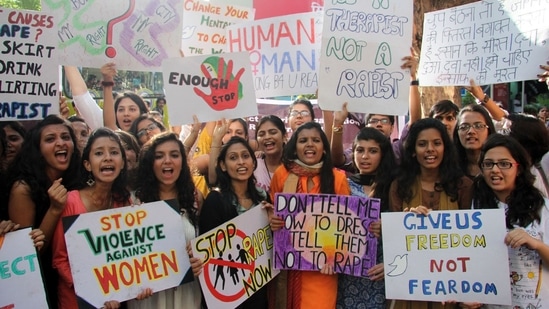Another depressing year of normalised gendered violence
From a woman being hit and dragged for several kilometres by a car of men to another being urinated on by a drunk man on a flight, women are suffering. Worse, every Indian woman can imagine being on the receiving end of this kind of violence. This is an indictment of our society
From the roads of Kanjhawala in the national Capital to the skies above the United States, what a terrible few days it has been for India’s women.

In Delhi, a young woman, all of 20, is hit by a car full of drunk men and then dragged for kilometres on end till her skull is smashed, her brain matter ripped out, and her body stripped of every piece of clothing.
I have been haunted by the thought of Anjali Singh, the only breadwinner in a family helmed by a single mother who has kidney disease, being left to die alone. Worse, a woman who calls herself Anjali’s friend — CCTV footage clearly shows another young woman riding behind her — not just abandons her but doesn’t even call for help. Now, she is slandering her in the most horrendous example of victim shaming by suggesting that Anjali was drunk, trying to shift the blame away from the men who killed her. The autopsy, which says Anjali’s body bears the scars of 40 injuries, makes no mention of alcohol in the bloodstream.
But, as the mother of the woman who was raped and murdered on her way home from a movie on December 16, 2012, told me, “Just like in the case of my daughter, the whispers have begun”. These are the typical judgmental, scurrilous whispers about girls who drink, women who stay out too late — women who take too many risks. The subtext: Stay at home, don’t work, don’t party, don’t have a good time; the “be practical” moralising, which is just an excuse to confine us, restrain us, shackle us, and bind us to timidity.
Then there are those — men mostly — who ask why what happened with Anjali has anything to do with gender. There is an effort to normalise this as an “accident”. These people did not grow up like the rest of us did — steering clear of rowdy men speeding on bikes and scooters through our residential neighbourhoods, catcalling and whistling, often lunging forward to paw a buttock, grab a breast, before speeding off.
I remember walking home from the bus stop or the colony market and pretending to enter the gates of homes that were not mine just to step away from such predators. There is every reason to believe that Anjali’s scooter was targeted precisely because she was a woman. Men speeding around in a Baleno with impunity — one of them a local Bharatiya Janata Party (BJP) worker — spot two women alone on a two-wheeler and decide to have a go at it.
Every woman in India, from her own experience, can imagine this happening to them. And don’t even dare tell us that these men did not know that there was a body caught in the underbelly of their vehicle. Even Anjali’s treacherous friend has testified that she was screaming in pain and the men who hit her heard her. This is not an unfortunate accident. This is a killing.
But the myth that you need a dark, unlit corner of a shanty town for women to feel vulnerable and violated has been busted this week with what we now know happened on board an Air India flight from New York to Delhi in its business class section. And the class bias that perpetrators of this kind come from lower-income, uneducated groups has also been unequivocally called out.
The JFK-Delhi non-stop route on Air India is one I fly routinely and mostly always praise. I am almost always standing up for an airline that I feel is lazily attacked by Indian passengers who suck up racism and worse on western airlines. But there is no defence possible in the case of Shankar Mishra, a well-heeled executive of Wells Fargo, who unzipped himself and urinated on an elderly woman. What happened next is even more horrendous.
I have some sympathy for the cabin crew that must also be at the receiving end of boorish, drunk passengers. I have heard horror stories of how female crew are treated. But surely the way to manage a sexual predator — and let’s call it what it is — is not to force the victim of the crime to have a conversation with the man who did this to her. Mishra was sexually and physically abusive, but he was also a risk to flight safety. He disrupted order on the flight and should have been isolated. The female passenger should have been upgraded to first class, something her testimony says was vetoed. Mishra should have been arrested on landing in Delhi and then it should have been up to the police to decide how to proceed. That this incident happened in November, but criminal action has been taken only now is absolutely unacceptable.
At the start of 2023, for India’s women, this is a depressing sense of déjà vu.
Barkha Dutt is an award-winning journalist and author
The views expressed are personal
All Access.
One Subscription.
Get 360° coverage—from daily headlines
to 100 year archives.



HT App & Website







